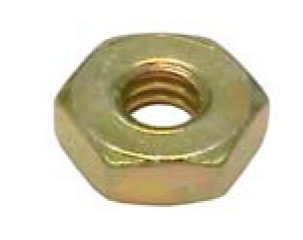
Hex nuts are synonymous with threaded fasteners. They are typically used to secure the end of a bolt. After placing a bolt through two or more workpieces or parts, you can install a hex nut on the end of the bolt. Bolts have external threading that supports the internal threading of a hex nut.
All hex nuts, of course, feature a hexagonal shape. They still have circular threading inside of them, but they have a hexagonal exterior. Here are four of the most common types of hex nuts.
#1) Standard
Standard hex nuts are characterized by a simple design. As shown in the photo above, they feature a hexagonal shape without any modifications or additional features. Standard hex nuts are highly versatile. You can use them in countless fastening applications — assuming you choose the right size.
#2) Flange
Flange hex nuts are distinguished from standard hex nuts by their wide flange. One end of a flange hex nut is wider than the other end. This wide flange acts like a washer. It will distribute the load of the bolt with which it’s used.
If you choose a standard hex nut, you’ll have to install a separate washer on it to achieve load distribution. A flange hex nut eliminates the need for a separate washer. All flange hex nuts come with an integrated nut
#3) Slotted
There are slotted hex nuts as well. Slotted hex nuts feature vertical grooves or slots cut into them. Also known as castellated hex nuts, they are typically used in fastening applications where vibrations are present.
Vibrations can cause most nuts, including hex nuts, to loosen. But slotted hex nuts are better protected against vibration-related loosening. They are classified as locknuts that, like other locknuts, will remain in place after being installed on a bolt.
#4) Capped
Another common type of hex nut is capped. Capped hex nuts have a round cap on one end. One end looks like a standard hex nut with six flat, equally spaced sides. The other end features a round cap or dome.
Capped hex nuts offer a cleaner appearance than standard hex nuts. More importantly perhaps, they protect the bolt with which they are used. The end of the bolt won’t be exposed if it features a capped hex nut. The capped hex nut will cover the end of the bolt while subsequently protecting it from environmental damage. You can find other types of hex nuts, but standard, flange, slotted and capped are some of the most common.



